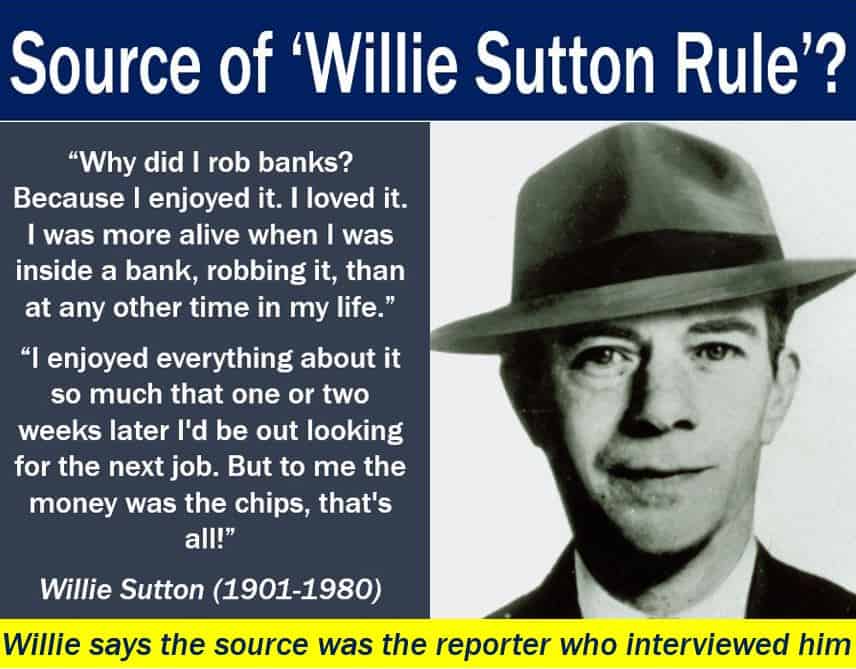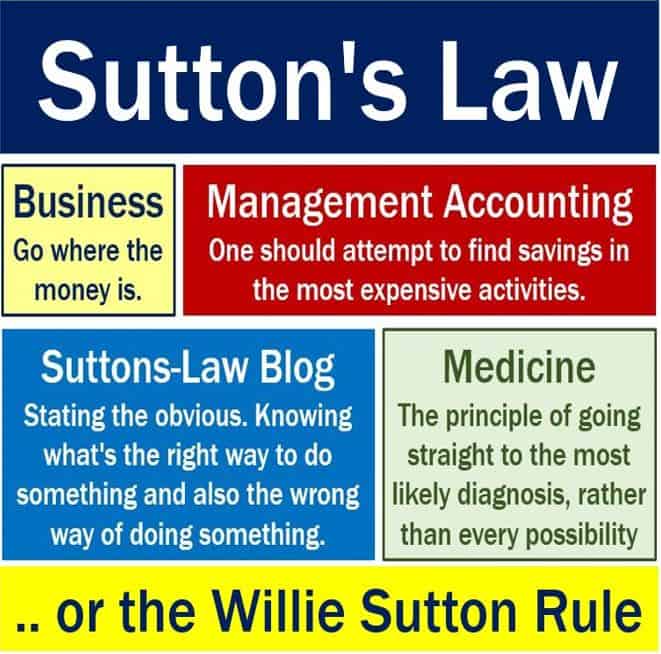Willie Sutton Rule – definition and meaning
The Willie Sutton Rule, or Sutton’s Law, states that we should focus on where the money is, which in the world of business means the most profitable activates, rather than wasting valuable time on less lucrative ones. Choose whatever is most likely to produce the highest yield.
According to an article written by Robert S. Kaplan and Robin Cooper – ‘Cost & Effect: Using Integrated Cost Systems to Drive Profitability and Performance’ – published by Harvard Business School Press, in management accounting, the Willie Sutton Rule stipulates that costing in which activities are prioritized by need, and budgeted accordingly – activity-based accounting – should be applied where the greatest costs exist, because that is where the company can make the biggest savings.
In science, Sutton’s Law states that when we are diagnosing, we should consider the obvious first – tests which could either confirm or rule out the most likely diagnosis should be carried out first.
 Willie Sutton, a famous American bank robber, said that he was not the source of the term ‘Willie Sutton Rule’. He claimed that a reporter who interviewed him, Mitch Ohnstad, quoted him on something he had never said. (Image: adapted from FBI.gov)
Willie Sutton, a famous American bank robber, said that he was not the source of the term ‘Willie Sutton Rule’. He claimed that a reporter who interviewed him, Mitch Ohnstad, quoted him on something he had never said. (Image: adapted from FBI.gov)
Willie Sutton Rule – etymology
Etymology is the study of the origin of words, phrases, idioms and expressions, and how their meanings evolved over time.
The term is named after William Francis ‘Willie’ Sutton, Jr. (1901-1980), a notorious American bank robber, who during his forty-years of criminal activity was estimated to have robbed more than $2 million. He spent more than half his adult life behind bars, and escaped from prison three times.
In a famous apocryphal (of doubtful authenticity) story, Mr. Sutton was asked by Mitch Ohnstad, a reporter, why he targeted banks. Mr. Sutton replied: “Because that is where the money is,” so Mr. Ohnstad wrote.
From that quote, today we have the term Willie Sutton Rule or Sutton’s Law.
 Sutton’s Law or the Willie Sutton Rule is used in several different disciplines. (Data sourced partly from suttons-law.blogspot.co.uk)
Sutton’s Law or the Willie Sutton Rule is used in several different disciplines. (Data sourced partly from suttons-law.blogspot.co.uk)
When medical students are told that they should focus a workup on the most likely diagnosis, instead of wasting money, time and valuable resources investigating every single possibility, Sutton’s Law is often invoked.
The Willie Sutton Rule is used in several different disciplines – including accounting, medicine, science, and business – in each case what it states is more or less the same: “Go for the most obvious!”
Mr. Sutton denied ever having been the source of the term – he believed that the credit should go to the reporter. In his autobiography, Mr. Sutton wrote:
“The irony of using a bank robber’s maxim as an instrument for teaching medicine is compounded, I will now confess, by the fact that I never said it. The credit belongs to some enterprising reporter who apparently felt a need to fill out his copy.
I can’t even remember where I first read it. It just seemed to appear one day, and then it was everywhere.”
“If anybody had asked me, I’d have probably said it. That’s what almost anybody would say … it couldn’t be more obvious.”
Arthur Conan Doyle’s famous detective, Sherlock Holmes once said: “When you have eliminated the impossible, whatever remains, however improbable, must be the truth.” The Willie Sutton Rule approaches the situation the other way round – it tells you to go for whatever appears to be the most likely first.
Video – Willie Sutton Rule
In this video, Jake Chesney talks about the Willie Sutton Rule (he says ‘Willie Sutton Law’), the bank robber from whom the term supposedly derived, and some of the things Willie Sutton said and did.

